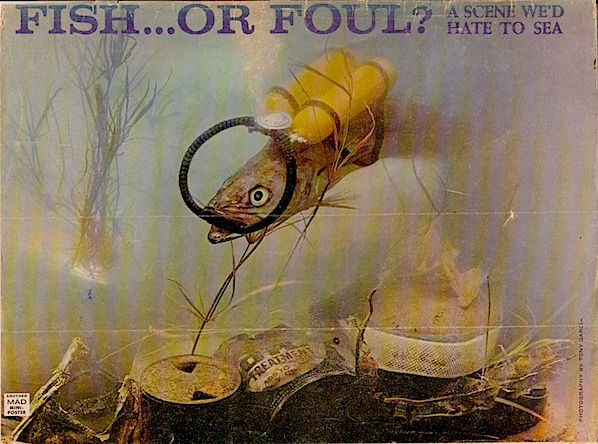Search
Recent comments
- military heat....
31 min 25 sec ago - arseholic....
5 hours 14 min ago - cruelty....
6 hours 31 min ago - japan's gas....
7 hours 11 min ago - peacemonger....
8 hours 8 min ago - see also:
17 hours 9 min ago - calculus....
17 hours 23 min ago - UNAC/UHCP...
22 hours 4 min ago - crafty lingo....
23 hours 28 min ago - off food....
23 hours 36 min ago
Democracy Links
Member's Off-site Blogs
pollution and toxic blooms and water and fish and trouble..

In South Florida this summer, one ecological scourge has piled on top of another.
First came the red tide, a flotilla of microorganisms that dyed the sea rust and eventually stretched out along 100 miles of the Gulf Coast. Oxygen-starved fish, eels, dolphins and turtles littered beaches, in numbers too vast to count. In one marina, so many fish went belly up that they appeared to pave a walkway across the water.
The foul siege reached from Sarasota nearly to the tip of Florida by early June, when ecological insult No. 2 arrived. A green film of cyanobacteria appeared, as it regularly does in summer, in vast Lake Okeechobee. But this year the bacteria also spilled over into rivers and canals, which carried the toxic green sludge east to the Atlantic Ocean and west to the Gulf of Mexico. Already distressed Floridians gagged on the noxious odor, and more than a dozen people reportedly went to local emergency rooms after coming into contact with the contaminated water. Some wept as beloved manatees expired, bloated and tinted a ghastly green.
Read more:
https://www.nbcnews.com/news/us-news/toxic-red-tide-making-floridians-si...
Image at top: back page of Mad Magazine, December 1975...
- By Gus Leonisky at 5 Aug 2018 - 4:33pm
- Gus Leonisky's blog
- Login or register to post comments
we should not be clinging to straws any more...
Have you heard this statistic? Australians use an estimated 10 million plastic straws a day.
Maybe you read it on an environmental activist's site, in government information, or even here in an ABC news story. Maybe you saw it on the War on Waste.
So where does that estimate come from? This question was asked of us by a member of our Facebook group, I'm pretty sure that's not science... but what at first seemed like a simple fact-checking job became more complicated.
Despite searching our own archives and contacting numerous environmental groups, we couldn't find the original source for this number.
Attention-grabbing statistics can take on a life of their own, even when their sourcing is uncertain, said environmental consultant Peter Allan from Sustainable Resource Use.
"With figures like this, sometimes they gather momentum and no one knows where it originated and that's a real worry," he said.
But we all know that plastic straws are a problem. When people are wrenching them out of turtles' noses, should we care about exactly how many we throw away?
Read more:
http://www.abc.net.au/news/science/2018-08-05/plastic-straws-how-many-do...
old fish and fishy tails...
The claim was taken on its word by NSW Labor leader Michael Daley, who tweeted yesterday that the fish had survived "two world wars & the Great Depression [sic]" before perishing this week.
Matthew O'Connell is currently finishing up his PhD studying taxidermised Murray cod and said the existence of a century-old fish is unlikely.
Though no one contests this week's incident is a tragedy — with the NSW Government yesterday confirming more deaths in two lakes in separate locations across the state — some have questioned the claim made by one of the farmers, Rob McBride.
Mr McBride said the dead fish he was carrying was "100 years old and it's never coming back".
"They're a very long lived fish, it wouldn't be unusual for a fish to be 30 to 40 years old.
"But a 100-year-old fish would be an exceptional fish, and there's been nothing like that ever recorded in the literature, in the science."
Speaking to the ABC, Mr McBride said local fisherman were certain some of the cod were between 80 to 100 years old.
Read more:
https://www.abc.net.au/news/2019-01-11/fish-deaths-from-algae-bloom-trag...
No fish older than 40 years?. BS:
Greenland sharks are now the longest-living vertebrates known on Earth, scientists say.
Researchers used radiocarbon dating to determine the ages of 28 of the animals, and estimated that one female was about 400 years old.
The team found that the sharks grow at just 1cm a year, and reach sexual maturity at about the age of 150.
The research is published in the journal Science.
Lead author Julius Nielsen, a marine biologist from the University of Copenhagen, said: "We had our expectations that we were dealing with an unusual animal, but I think everyone doing this research was very surprised to learn the sharks were as old as they were."
The former vertebrate record-holder was a bowhead whale estimated to be 211 years old.
But if invertebrates are brought into the longevity competition, a 507-year-old clam called Ming holds the title of most aged animal.
Slow swimmersGreenland sharks are huge beasts, that can grow up to 5m in length.
They can be found, swimming slowly, throughout the cold, deep waters of the North Atlantic.
With this leisurely pace of life and sluggish growth rate, the sharks were thought to live for a long time. But until now, determining any ages was difficult.
Read more:
https://www.bbc.com/news/science-environment-37047168
Sharks are part of the fish kingdom.
Fish are gill-bearing aquatic craniate animals that lack limbs with digits. They form a sister group to the tunicates, together forming the olfactores. Included in this definition are the living hagfish, lampreys, and cartilaginous and bony fish as well as various extinct related groups.
All this should not distract us from the catastrophe that has — one more — destroyed an AUSTRALIAN river...